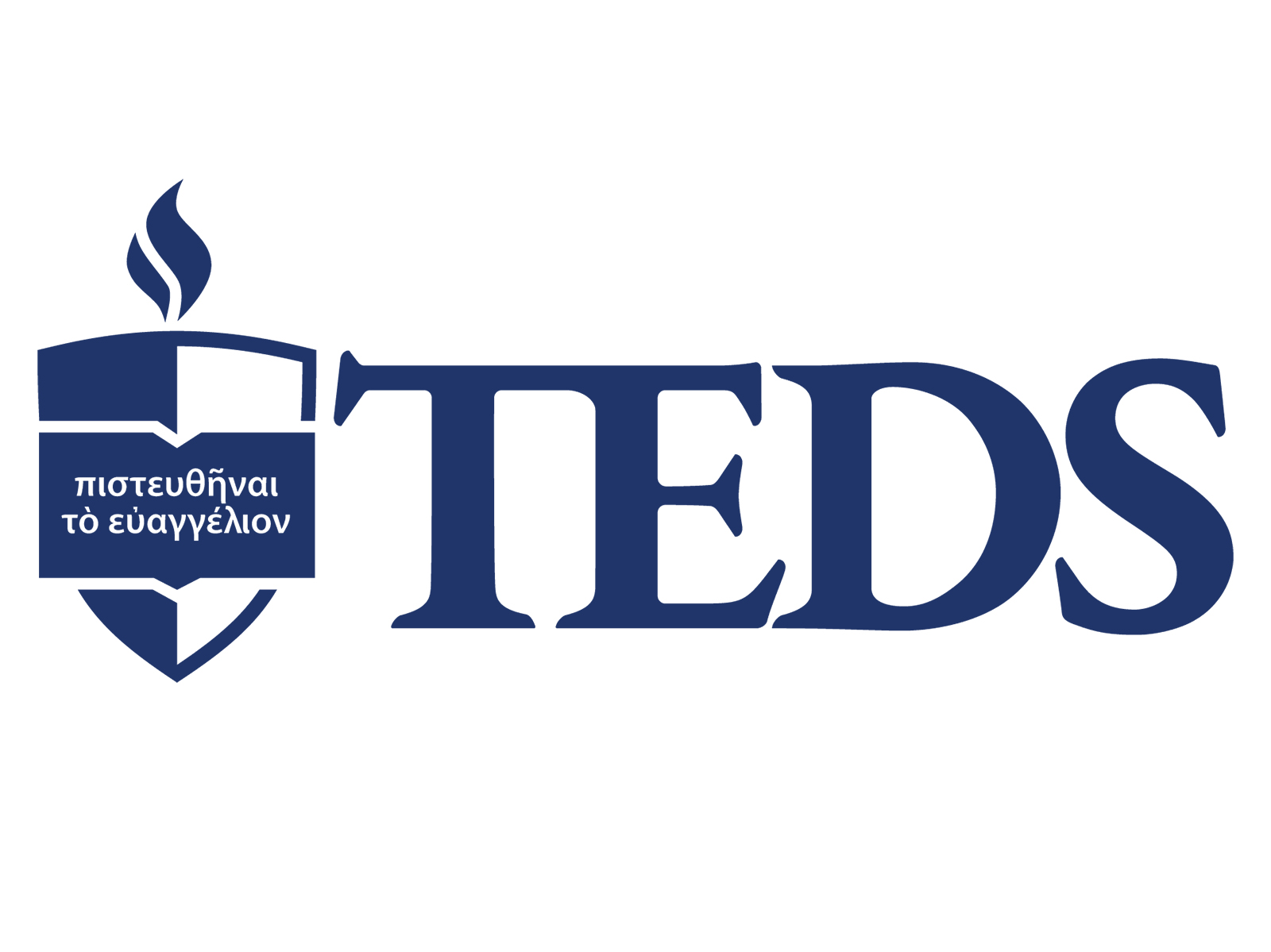(RNS) — The Evangelical Free Church long had an outsized role in evangelicalism and helped give birth to such institutions as The Gospel Coalition and Sojourners magazine. But declining enrollment and financial struggles have dogged the school for years.

Trinity Evangelical Divinity School logo. (Courtesy image)
Bob Smietana
April 8, 2025
(RNS) — A prominent but troubled evangelical seminary has agreed to be acquired by a Canadian university and move to British Columbia, the school’s leaders announced Tuesday (April 8).
The move comes after years of financial struggle and declining attendance at Trinity Evangelical Divinity School — known as TEDS — an Evangelical Free Church school whose alums have played an outsized role in shaping American evangelicalism.
Trinity will continue to hold classes at its Bannockburn, Illinois, campus north of Chicago during the 2025-2026 academic year but will move to the campus of Trinity Western University in Langley, British Columbia, in 2026. Current faculty will get a contract for the coming year but it’s unclear how many will move to Canada in the future.
The school said current students will be able to complete their program through in-person and online options. Students who are U.S. citizens will still be eligible for federal financial aid, though the school said details about scholarships for students have yet to be determined.
Along with moving, TEDS will part ways with Trinity International University, its parent nonprofit, which will continue to run online classes and operate a law school in Santa Ana, California. Trinity International President Kevin Kompelien said that given the challenges in higher education, the divinity school needed to ally itself with a larger institution.
“I believe a school like TEDS will thrive best and accomplish our mission most effectively as part of a larger theologically and missionally aligned evangelical Christian university,” Kompelien said in a statement.
RELATED: Theological schools report continued drop in master of divinity degrees
Founded by Scandinavian immigrants, Trinity was born from a merger in the 1940s of the Chicago-based Swedish Bible Institute and the Minnesota-based Norwegian-Danish Bible Institute. Though affiliated with the Evangelical Free Church, a Minneapolis-based denomination with 1,600 churches, the school has long sought to influence the wider evangelical world. Longtime former dean Kenneth Kantzer, who led the school from 1960 to 1978 and helped it grow to national prominence, called TEDS “the Free Church’s love gift to the worldwide church of Christ.”
Among the school’s alumni are historian Randall Balmer, Sojourners founder Jim Wallis, New Testament scholars Scot McKnight and Craig Blomberg, disgraced evangelist Ravi Zacharias, Christian television host John Ankerberg and Collin Hansen, editor-in-chief of The Gospel Coalition. Longtime professor Don Carson also was one of the founders of The Gospel Coalition, helping launch the so-called Young, Restless and Reformed movement that led to a Calvinist revival among evangelicals. Kantzer went on to be editor of Christianity Today magazine. The school is also home to a number of centers, including the Carl F.H. Henry Center for Theological Understanding, named for a prominent evangelical theologian.
But over the last decade, Trinity has fallen on hard times. In 2015, the divinity school had 1,182 students — the equivalent of 753 full-timers — making it one of the nation’s larger seminaries. By the fall of 2024, that had dropped to 813 students and 403 full-time equivalents.
In 2023, the university shut down its on-campus programs, leaving it with too much property and not enough students. The university ran a $17.3 million deficit in 2023, according to its latest financial disclosure to the IRS, after shutting down its in-person undergraduate program. Trinity’s 2024 audit shows a $7.6 million deficit, with a similar deficit expected this year. A $19 million long-term loan is also coming due in 2026.
The entire Trinity campus is currently under contract, and the school hopes to close on that sale in October. After the sale is complete, Trinity will lease back part of the campus for the rest of the academic year and use the proceeds to pay off the $19 million loan. About 100 students currently live on campus and their leases will become month to month for the upcoming academic year.
A university spokesman said many details of TWU’s acquisition of TEDS remain to be sorted out, such as what happens to the Henry Center and other centers at the school and how many professors will move to Canada. The two schools are doing due diligence in hopes of finalizing the acquisition by the end of 2025.
Trinity Western will not take on any of TED’s financial obligations as part of the merger. The Canadian school’s president said the merger will lead to a “stronger combined future.”
“We are privileged to continue a longstanding legacy of evangelical scholarship and expand the impact of a global Christian education,” TWU President Todd F. Martin said in a statement. “We are driven by the same heartbeat for the gospel, and together, we can do even more to serve the Church and societies worldwide.”
Historian Joey Cochran, a TEDS alum, said news of the move to Canada is another sign that evangelicalism in the Midwest is on the decline. Institutions like TEDS, he said, once helped shaped the movement, but now most of the power has shifted to the South, he said, pointing out that Baptist seminaries in the South dominate theological education, with nearly 20,000 students enrolled in the six seminaries run by the Southern Baptist Convention or at Liberty University. That’s more than a quarter of the 74,000 seminary students in the U.S., according to data from the Association of Theological Schools, which includes Protestant, Roman Catholic, Orthodox and Jewish graduate schools of theology.
“We are seeing, in real time, the Southern-ification of evangelicalism,” said Cochran.
Mike Woodruff, pastor of Christ Church, a multisite evangelical church based in Lake Forest, Illinois, not far from the TEDS campus, said news of the move and merger is sad but not unexpected.
“Most graduate schools in theology are struggling,” he said. “It’s just a very different world.”
Woodruff said his church had hired grads from TEDS in the pasts and that professors from TEDS have taught in the church’s programs. The school’s presence will be missed, he said.
“It’s a loss,” he said.
Mark Labberton, former president of Fuller Theological Seminary in Pasadena, California, said Trinity, like many seminaries, including Fuller, has faced serious headlines in recent years, like nearly all institutions of higher learning. While the school had outsized influence, it was tied to a smaller denomination, so had fewer resources to draw on. And while many TEDS graduates were known for their ability to innovate and influence, the school itself was less so.
“It would be known for faithfulness but not creativity alongside faithfulness,” said Labberton.
Ed Stetzer, dean of the Talbot School of Theology at Biola University, said TEDS was often referred to as the “Queen of the Seminaries” and was well respected for its influence in theological education. News of the move and the school’s troubles is unsettling, he said.
“It’s a jarring moment in theological education, and a sign of the times,” he said. “Seminary education is in trouble — and more closures and mergers are coming, unless seminaries and churches find new and innovative ways to partner.”
David Dockery, a former Trinity International University president who now leads Southwestern Baptist Theological Seminary in Fort Worth, Texas, said he has hope for the future of TEDS. The school has reinvented itself before, moving from Minneapolis to downtown Chicago and later to the Chicago suburbs.
“This in many ways will be Trinity 4.0,” he said. “It now has an opportunity for a new and next phase, and I pray God’s blessings upon them as they make this important transition.”
Dockery said the combination of theological excellence and Scandinavian piety — from its Free Church founding — helped TEDS gain global influence. “That combination made for a marvelous institution that attracted some of the best scholars in the evangelical world,” he said.






